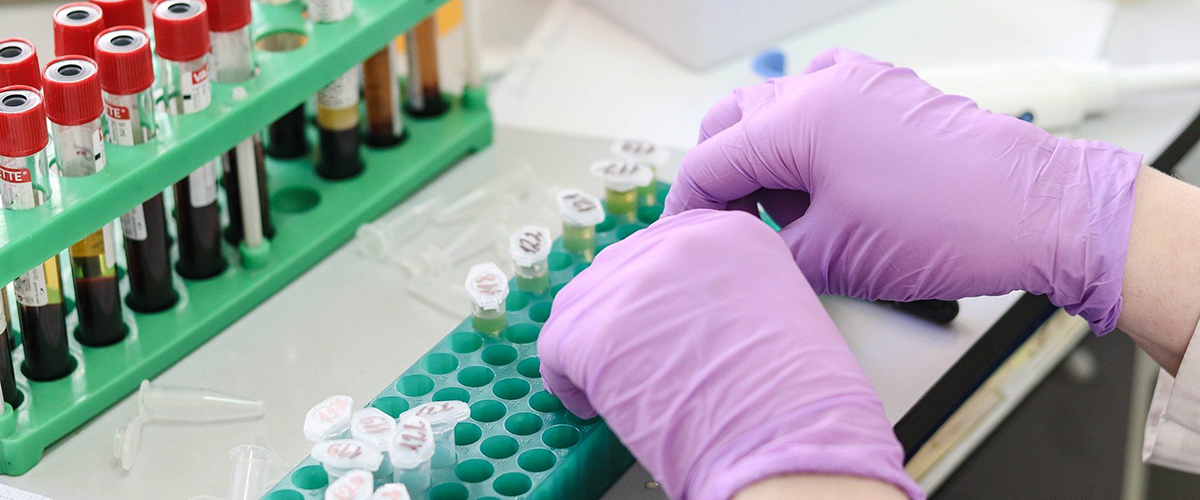News | SummitMD
Clinical Evidence Mounts Toward Remdesivir As Potential COVID-19 Therapy
South Korea approves remdesivir imports after trial demonstrates cut recovery time, albeit no mortality benefit
Six months into the pandemic and with no proven treatment in sight, remdesivir is rising as a potential therapeutic option for the patients with moderate COVID-19 after trials showed it sped up recovery with few adverse effects, although it did not slash mortality rates.
Foster City, California-based Gilead Sciences originally developed remdesivir (GS-5734) as a treatment for Ebola, although it failed related clinical trials. Several studies had identified remdesivir as a potential candidate for COVID-19 therapeutics for its ability to inhibit SARS-CoV-2 in vitro. 1
The U.S. Food and Drug Administration (FDA) on May 1 approved remdesivir to treat confirmed COVID-19 in adults and children hospitalized with severe disease. 2 The decision came two days after the National Institutes of Health’s (NIH) clinical trial showed “promising” results.
In the NIH study published in the New England Journal of Medicine (NEJM) on May 22, remdesivir pulled through in a double-blind, randomized, placebo-controlled trial by shortening the time to recovery from 15 to 11 days compared to placebo, although it did not improve mortality rates. 3
The multinational, multicenter, double-blind, randomized, placebo-control study – led by John H. Beigel, M.D. from the National Institute of Allergy and Infectious Diseases (NIAID) – compared the efficacy and safety of intravenous remdesivir versus a placebo on 1,063 patients. Included in the study were COVID-19 patients from 47 U.S. medical sites and 21 international institutions from Europe, Korea, Japan, and Singapore, among others.
Patients were randomized into a remdesivir arm (n=538) and a control arm (n=521). In the remdesivir arm, investigators administered a 200 mg loading dose of intravenous remdesivir on day one followed by 100 mg daily for up to nine additional days. The placebo arm was administered placebo for 10 days.
Investigators divided patients into eight categories based on factors such as hospital discharge as well as whether they required supplemental oxygen and ongoing medical care. The study included hospitalized patients requiring at least one of the following: supplemental oxygen, noninvasive ventilation, high-flow oxygen devices, invasive mechanical ventilation or extracorporeal membrane oxygenation (ECMO).
The primary endpoint was defined as the time to recovery, defined by either hospital discharge or hospitalization for infection-control purposes only. Investigators claimed that they did not define the mortality rate as the primary endpoint, considering that enrolling the prerequisite of 2,000 patients and recording at least 200 deaths was not feasible during the pandemic.
Study results showed that remdesivir compared to placebo shortened time to recovery by 31 percent. Recovery time in the remdesivir arm totaled 11 days while the recovery time in the placebo arm amounted to 15 days (95% CI, 13~19).
Kaplan-Meier estimates showed that the mortality rate in the remdesivir arm was 7.1 percent and 11.9 percent in the placebo arm at 14 days, yielding a statistically non-significant difference of 30 percent (HR 0.70, 95% CI 0.47~1.04).
At the same time, the remdesivir arm reported fewer serious adverse events with side effects occurring in 114 out of 541 patients and the placebo group reporting side effects in 141 out of 522 patients.
In line with these findings, Beigel’s team reported that “remdesivir was superior to placebo in shortening the time to recovery in adults hospitalized with COVID-19 and [provided] evidence of lower respiratory tract infection.”
The team also noted that the NIH trial design overcame limitations associated with two previously published remdesivir studies from Chinese researchers and Gilead Sciences.
China-Japan Friendship Hospital’s Yeming Wang, MD Department of Pulmonary and Critical Medicine, Center of Respiratory Medicine in Beijing, China published data from a randomized, double-blind, placebo-control multicenter trial of 10 hospitals in Hubei, China in The Lancet on April 29. 4
Wang’s study showed that remdesivir did not demonstrate statistically significant clinical benefits. Clinical benefits encompassed time to clinical improvement within 28 days after randomization, defined as a two-point reduction in patients’ admission status of a six-point ordinal scale, or discharge from the hospital – whichever came first. The trial was stopped early because of adverse events in 12 percent of patients in the remdesivir arm and 5 percent of patients in the placebo arm.
However, NIH study investigators noted that Wang’s study had around 240 patients, which was “not enough” to assess efficacy.
Gilead Sciences also published remdesivir data that looked at the efficacy of remdesivir in 5-days versus 10-days of treatment, without a placebo arm. 5 Study results showed that efficacy and adverse events in the two arms were similar, drawing media attention.
NIH trial investigators again pointed out that there was no control group, thereby diminishing the significance of the findings.
Having overcome these study design limitations, the NIH study now stress remdesivir as a treatment option for COVID-19. Adding to this pile of evidence is Gilead Sciences’ phase 3 SIMPLE trial that reportedly demonstrated the efficacy and safety of remdesivir in COVID-19 patients with moderate disease. 6
The open-label study evaluated 5-day and 10-day courses of remdesivir plus standard of care, versus standard of care alone, demonstrating patients in the 5-day remdesivir treatment group were 65 percent more likely to have clinical improvement at day 11 compared with those in the standard of care group (OR 1.65, 95% CI 1.09-2.48, p=0.017). Gilead Sciences noted no new safety signals with remdesivir across either treatment group.
Amidst the mounting evidence, the Ministry of Food and Drug Safety (MFDS) – South Korea’s drug approving agency – announced on June 3 that it would import remdesivir to treat COVID-19 after approving a request from Korea Centers for Disease Control and Prevention’s (KCDC) expert infectious disease panel.
Prior to the approval, the KCDC on May 29 requested the MFDS import remdesivir under a specialized track that allows for drug imports in emergency situations without prior approval.
“The expert panel has evaluated remdesivir as a safe and effective drug for COVID-19 and affirmed the medical necessity of the drug in circumstances where there are no alternative anti-viral agents,“ KCDC Director Jeong Eun-kyeong said.
Despite the progress made, experts are noting that improvements can still be made, citing how anti-viral HIV therapies often go through a period of re-evaluation and development until the production of safe and effective drugs.
Accordingly, more trials are underway to test remdesivir and a number of other drugs for COVID-19. 7 The NIH announced on May 8 that it would be rolling out a double-blind trial testing remdesivir with an anti-inflammatory drug baricitinib for COVID-19. The trial is expected to open at approximately 100 U.S. and international sites and enroll more than 1,000 participants. Baricitinib is a product licensed to Eli Lilly and Company by Incyte and marketed as Olumiant.
Investigators will evaluate the time to recovery between a baricitinib plus remdesivir combination arm versus a remdesivir arm. Remdesivir will be administered as one 200 mg intravenous dose followed by 100 mg once-daily intravenous dose for the duration of hospitalization up to a 10-day total course of treatment. Baricitinib will be administered as 4 mg oral dose, or crushed and given through a nasogastric tube if necessary, for the duration of hospitalization up to a 14-day total course of treatment.
“We now have solid data showing that remdesivir diminishes to a modest degree the time to recovery for people hospitalized with COVID-19,” NIAID Director Anthony S. Fauci said in a press release. “[This trial] will examine if adding an anti-inflammatory agent to the remdesivir regimen can provide additional benefit for patients, including improving mortality outcomes.”
With the remdesivir trial in full swing, industry insiders are tracking whether remdesivir will demonstrate mortality benefits while hoping for developments of second or third generation of RNA-dependent RNA polymerase drugs based on remdesivir’s proof-of-concept trial.
Speculation and hopes aside, experts on the ground are stressing two points: more therapeutic options for COVID-19 need development, and more trials testing them need to be run.
- https://www.nature.com/articles/s41422-020-0282-0
- https://www.fda.gov/news-events/press-announcements/coronavirus-covid-19-update-fda-issues-emergency-use-authorization-potential-covid-19-treatment
- https://www.nejm.org/doi/full/10.1056/NEJMoa2007764
- https://www.thelancet.com/journals/lancet/article/PIIS0140-6736(20)31022-9/fulltext
- https://www.nejm.org/doi/full/10.1056/NEJMoa2015301
- https://www.gilead.com/news-and-press/press-room/press-releases/2020/4/gilead-announces-results-from-phase-3-trial-of-investigational-antiviral-remdesivir-in-patients-with-severe-covid-19
- https://www.nih.gov/news-events/news-releases/nih-clinical-trial-testing-antiviral-remdesivir-plus-anti-inflammatory-drug-baricitinib-covid-19-begins
Edited by

Pil Hyung Lee, MD
Seosan Jungang Hospital, Korea (Republic of)

Hanbit Park , MD
GangNeung Asan Hospital, Korea (Republic of)
Written by

YoonJee Marian Chu, Medical Journalist
Read Biography
Six months into the pandemic and with no proven treatment in sight, remdesivir is rising as a potential therapeutic option for the patients with moderate COVID-19 after trials showed it sped up recovery with few adverse effects, although it did not slash mortality rates.
Foster City, California-based Gilead Sciences originally developed remdesivir (GS-5734) as a treatment for Ebola, although it failed related clinical trials. Several studies had identified remdesivir as a potential candidate for COVID-19 therapeutics for its ability to inhibit SARS-CoV-2 in vitro. 1
The U.S. Food and Drug Administration (FDA) on May 1 approved remdesivir to treat confirmed COVID-19 in adults and children hospitalized with severe disease. 2 The decision came two days after the National Institutes of Health’s (NIH) clinical trial showed “promising” results.
In the NIH study published in the New England Journal of Medicine (NEJM) on May 22, remdesivir pulled through in a double-blind, randomized, placebo-controlled trial by shortening the time to recovery from 15 to 11 days compared to placebo, although it did not improve mortality rates. 3
The multinational, multicenter, double-blind, randomized, placebo-control study – led by John H. Beigel, M.D. from the National Institute of Allergy and Infectious Diseases (NIAID) – compared the efficacy and safety of intravenous remdesivir versus a placebo on 1,063 patients. Included in the study were COVID-19 patients from 47 U.S. medical sites and 21 international institutions from Europe, Korea, Japan, and Singapore, among others.
Patients were randomized into a remdesivir arm (n=538) and a control arm (n=521). In the remdesivir arm, investigators administered a 200 mg loading dose of intravenous remdesivir on day one followed by 100 mg daily for up to nine additional days. The placebo arm was administered placebo for 10 days.
Investigators divided patients into eight categories based on factors such as hospital discharge as well as whether they required supplemental oxygen and ongoing medical care. The study included hospitalized patients requiring at least one of the following: supplemental oxygen, noninvasive ventilation, high-flow oxygen devices, invasive mechanical ventilation or extracorporeal membrane oxygenation (ECMO).
The primary endpoint was defined as the time to recovery, defined by either hospital discharge or hospitalization for infection-control purposes only. Investigators claimed that they did not define the mortality rate as the primary endpoint, considering that enrolling the prerequisite of 2,000 patients and recording at least 200 deaths was not feasible during the pandemic.
Study results showed that remdesivir compared to placebo shortened time to recovery by 31 percent. Recovery time in the remdesivir arm totaled 11 days while the recovery time in the placebo arm amounted to 15 days (95% CI, 13~19).
Kaplan-Meier estimates showed that the mortality rate in the remdesivir arm was 7.1 percent and 11.9 percent in the placebo arm at 14 days, yielding a statistically non-significant difference of 30 percent (HR 0.70, 95% CI 0.47~1.04).
At the same time, the remdesivir arm reported fewer serious adverse events with side effects occurring in 114 out of 541 patients and the placebo group reporting side effects in 141 out of 522 patients.
In line with these findings, Beigel’s team reported that “remdesivir was superior to placebo in shortening the time to recovery in adults hospitalized with COVID-19 and [provided] evidence of lower respiratory tract infection.”
The team also noted that the NIH trial design overcame limitations associated with two previously published remdesivir studies from Chinese researchers and Gilead Sciences.
China-Japan Friendship Hospital’s Yeming Wang, MD Department of Pulmonary and Critical Medicine, Center of Respiratory Medicine in Beijing, China published data from a randomized, double-blind, placebo-control multicenter trial of 10 hospitals in Hubei, China in The Lancet on April 29. 4
Wang’s study showed that remdesivir did not demonstrate statistically significant clinical benefits. Clinical benefits encompassed time to clinical improvement within 28 days after randomization, defined as a two-point reduction in patients’ admission status of a six-point ordinal scale, or discharge from the hospital – whichever came first. The trial was stopped early because of adverse events in 12 percent of patients in the remdesivir arm and 5 percent of patients in the placebo arm.
However, NIH study investigators noted that Wang’s study had around 240 patients, which was “not enough” to assess efficacy.
Gilead Sciences also published remdesivir data that looked at the efficacy of remdesivir in 5-days versus 10-days of treatment, without a placebo arm. 5 Study results showed that efficacy and adverse events in the two arms were similar, drawing media attention.
NIH trial investigators again pointed out that there was no control group, thereby diminishing the significance of the findings.
Having overcome these study design limitations, the NIH study now stress remdesivir as a treatment option for COVID-19. Adding to this pile of evidence is Gilead Sciences’ phase 3 SIMPLE trial that reportedly demonstrated the efficacy and safety of remdesivir in COVID-19 patients with moderate disease. 6
The open-label study evaluated 5-day and 10-day courses of remdesivir plus standard of care, versus standard of care alone, demonstrating patients in the 5-day remdesivir treatment group were 65 percent more likely to have clinical improvement at day 11 compared with those in the standard of care group (OR 1.65, 95% CI 1.09-2.48, p=0.017). Gilead Sciences noted no new safety signals with remdesivir across either treatment group.
Amidst the mounting evidence, the Ministry of Food and Drug Safety (MFDS) – South Korea’s drug approving agency – announced on June 3 that it would import remdesivir to treat COVID-19 after approving a request from Korea Centers for Disease Control and Prevention’s (KCDC) expert infectious disease panel.
Prior to the approval, the KCDC on May 29 requested the MFDS import remdesivir under a specialized track that allows for drug imports in emergency situations without prior approval.
“The expert panel has evaluated remdesivir as a safe and effective drug for COVID-19 and affirmed the medical necessity of the drug in circumstances where there are no alternative anti-viral agents,“ KCDC Director Jeong Eun-kyeong said.
Despite the progress made, experts are noting that improvements can still be made, citing how anti-viral HIV therapies often go through a period of re-evaluation and development until the production of safe and effective drugs.
Accordingly, more trials are underway to test remdesivir and a number of other drugs for COVID-19. 7 The NIH announced on May 8 that it would be rolling out a double-blind trial testing remdesivir with an anti-inflammatory drug baricitinib for COVID-19. The trial is expected to open at approximately 100 U.S. and international sites and enroll more than 1,000 participants. Baricitinib is a product licensed to Eli Lilly and Company by Incyte and marketed as Olumiant.
Investigators will evaluate the time to recovery between a baricitinib plus remdesivir combination arm versus a remdesivir arm. Remdesivir will be administered as one 200 mg intravenous dose followed by 100 mg once-daily intravenous dose for the duration of hospitalization up to a 10-day total course of treatment. Baricitinib will be administered as 4 mg oral dose, or crushed and given through a nasogastric tube if necessary, for the duration of hospitalization up to a 14-day total course of treatment.
“We now have solid data showing that remdesivir diminishes to a modest degree the time to recovery for people hospitalized with COVID-19,” NIAID Director Anthony S. Fauci said in a press release. “[This trial] will examine if adding an anti-inflammatory agent to the remdesivir regimen can provide additional benefit for patients, including improving mortality outcomes.”
With the remdesivir trial in full swing, industry insiders are tracking whether remdesivir will demonstrate mortality benefits while hoping for developments of second or third generation of RNA-dependent RNA polymerase drugs based on remdesivir’s proof-of-concept trial.
Speculation and hopes aside, experts on the ground are stressing two points: more therapeutic options for COVID-19 need development, and more trials testing them need to be run.
- https://www.nature.com/articles/s41422-020-0282-0
- https://www.fda.gov/news-events/press-announcements/coronavirus-covid-19-update-fda-issues-emergency-use-authorization-potential-covid-19-treatment
- https://www.nejm.org/doi/full/10.1056/NEJMoa2007764
- https://www.thelancet.com/journals/lancet/article/PIIS0140-6736(20)31022-9/fulltext
- https://www.nejm.org/doi/full/10.1056/NEJMoa2015301
- https://www.gilead.com/news-and-press/press-room/press-releases/2020/4/gilead-announces-results-from-phase-3-trial-of-investigational-antiviral-remdesivir-in-patients-with-severe-covid-19
- https://www.nih.gov/news-events/news-releases/nih-clinical-trial-testing-antiviral-remdesivir-plus-anti-inflammatory-drug-baricitinib-covid-19-begins
Edited by

Pil Hyung Lee, MD
Seosan Jungang Hospital, Korea (Republic of)

Hanbit Park , MD
GangNeung Asan Hospital, Korea (Republic of)
Written by



Leave a comment